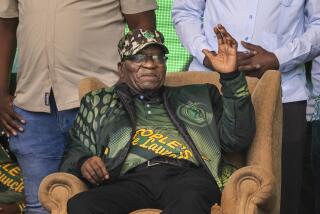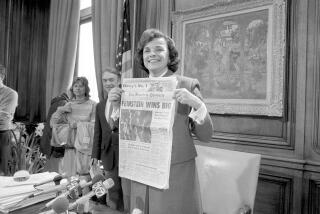A New South Africa Will Be Indebted to Helen Suzman’s Courage
- Share via
CAPE TOWN — With the retirement from political life of human-rights campaigner Helen Suzman, the liberal cause loses its strongest parliamentary champion.
Suzman, who is 71, says that she will not stand in the Sept. 6 general election. This prompts a rethink on the embattled role of liberalism in a race-troubled country.
Suzman is as near to being irreplaceable as anyone could be in public life. For 36 years, she has been a consistent and courageous opponent of apartheid and injustice. She went to Parliament in 1953 under the banner of the old United Party of wartime leader Gen. Jan Smuts. From 1961 to 1974, as a member of the breakaway Progressive Party, she was a lone liberal voice in Parliament.
Suzman represented a clear-cut tradition, which was a power for good in the harsh anti-liberal wilderness of South African politics. Her efforts for the masses crushed by apartheid will go down in South African history as one of the most remarkable campaigns for elementary justice.
Yet she suffered, with other liberals, from the movement of politics away from the genteel corridors of Parliament into the blood-spattered streets. Young blacks, nurtured in the bitter atmosphere of apartheid and seeing their townships virtually under army/police occupation, have been increasingly critical of white liberals who, they feel, dispense answers to their problems from on high, and from a position of relative affluence. Suzman’s parliamentary seat of Houghton was one of the wealthiest in the land.
Nevertheless, Suzman played a key role in challenging the government, refusing to be intimidated by the strongmen of the National Party, who alleged that she was helping the enemies of the country. There was plenty of sexist and anti-Semitic innuendo in attacks made on her, and her courage and steadfastness astounded political colleagues. She insisted on seeing the jailed Nelson Mandela way back in 1967 and, long before it became fashionable, called for his release--earning his warm appreciation and the respect of his followers.
The abolition of the pass laws a few years ago was the high point of her career. That would, perhaps, have been a better moment to go.
There are suggestions that, as she grew older, Suzman lost touch with some of the harsh new realities of South Africa, and her vehement rejection of sanctions against Pretoria was cited by the political left as evidence of this.
She also did not mince her words when she condemned black-on-black township violence; she was not prepared to condone the activities of people, white or black, who took the law into their own hands. This did not find favor with young black militants.
In a way, the criticism of Helen Suzman was symptomatic of the growing violence in the country and the consequent decline of liberal values, which were placed under pressure by this very violence. Yet she stuck to her guns and stood for values that she felt were durable and attainable, whoever runs the country.
The old Progressive Party has merged down the years with groups politically to its right, and it has been no secret that Suzman was not happy about some of the people taken on board. But she has not fired off any valedictory criticism of the new, merged Democratic Party, of which she is a member. She simply announced that this is the time to withdraw. This contrasts with State President P. W. Botha, who has had to be dragged kicking and screaming into retirement by his National Party.
Suzman will probably write her memoirs and make more frequent visits abroad, where she has been showered with well-earned honors by universities, governments and other institutions.
The small band of remaining liberals who have survived black anger and white repression will have to rethink their strategies and campaigns without her. One problem is that old-school liberalism is looking dated.
The debate in the country has moved a long way from the days when it turned purely on apartheid and repression. Most people realize that this racist policy is doomed, in the long if not in the short run, and the debate now turns more on class, economics, nationalization, private ownership--essentially, democratic socialism versus capitalism.
In this, what liberals still have to offer is what Helen Suzman stood for--values such as the rule of law, an independent judiciary, habeas corpus and equal treatment of all men and women under the law. They have to convince both white nationalists, who rule, and black nationalists, who demand to rule, that these values are worth upholding.
More to Read
Sign up for Essential California
The most important California stories and recommendations in your inbox every morning.
You may occasionally receive promotional content from the Los Angeles Times.













